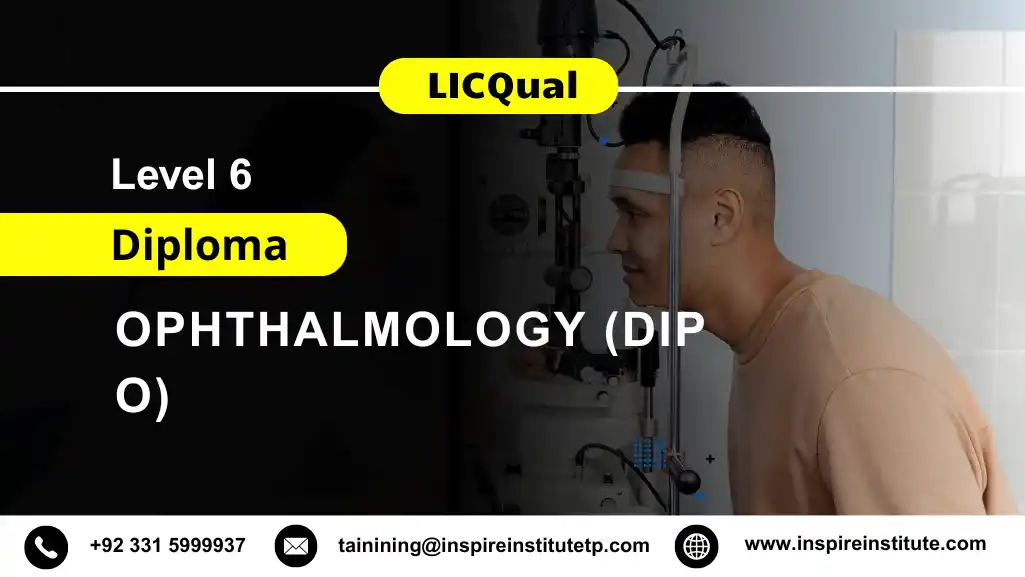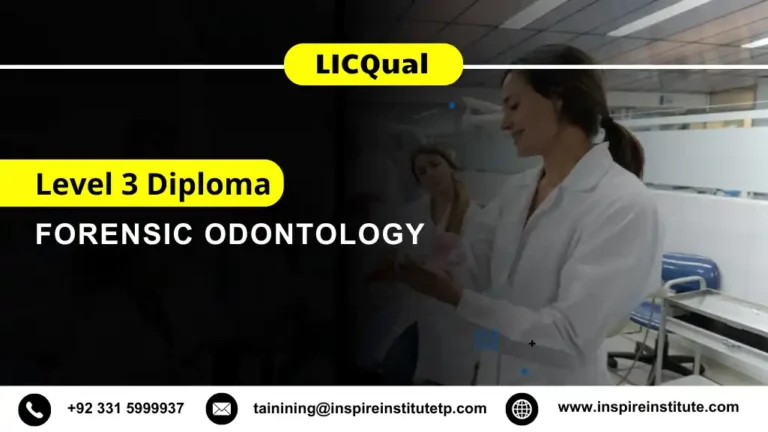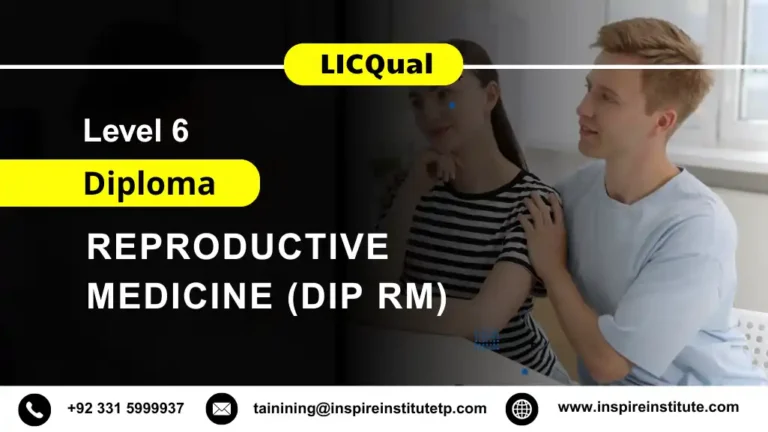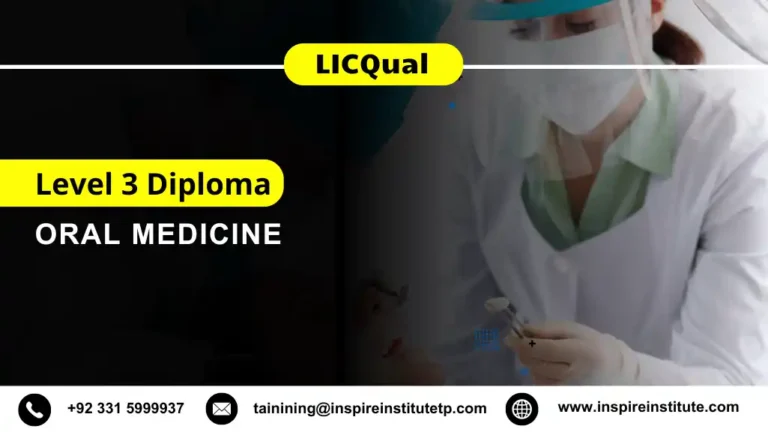LICQual Level 6 Diploma in Ophthalmology (Dip O)
The LICQual Level 6 Diploma in Ophthalmology (Dip O) responds to rising demand for experts who understand the anatomy, pathology, and treatment of diverse eye conditions. As populations age and diagnostic technologies evolve, the need for skilled ophthalmic professionals who can prevent vision loss, restore sight, and improve patient welfare has never been greater.
The purpose of this Diploma in Ophthalmology is to provide healthcare professionals—including doctors, ophthalmic nurses, optometrists, and allied health practitioners—with an academically rigorous, clinically relevant qualification. Scope of the course spans the basics of ocular anatomy and physiology, through to advanced diagnostics, surgical and non-surgical interventions, and management of complex ophthalmic diseases. Learners will engage with evidence-based theory, practical procedures, and best practices aligned to current ophthalmology standards and patient safety protocols.
Throughout, the course uses flexible, assignment-based study approaches combined with up-to-date curriculum content to ensure that whether you are practising in urban centres or remote clinics, in primary care or specialty eye services, you leave with the competence to deliver high-quality eye care. The Dip O qualification helps you see beyond current challenges, equipping you to lead with skill, insight, and compassion in ophthalmology.
Why Choose this Qualification
The LICQual Level 6 Diploma in Ophthalmology (Dip O) is a prestigious UK-accredited qualification tailored for healthcare professionals, eye specialists, and aspiring ophthalmic practitioners aiming to deepen their clinical expertise and advance their medical careers. This course blends theoretical excellence with clinical precision, preparing learners to diagnose, manage, and treat various eye and vision disorders effectively. By choosing this qualification, professionals gain not only advanced ophthalmological knowledge but also the confidence, competence, and credentials required to thrive in global healthcare settings.
Key Reasons to Choose this Qualification
Specialist Ophthalmic Knowledge
- Acquire a deep understanding of the anatomy, physiology, and pathology of the human eye.
- Explore critical conditions including glaucoma, cataracts, retinal disorders, and refractive errors.
- Learn modern diagnostic procedures such as slit-lamp examination, OCT, and visual field analysis.
- Understand ocular pharmacology and the use of medications in managing ophthalmic diseases.
- Gain expertise in identifying and preventing vision-threatening disorders through early detection.
Practical Clinical Application
- Engage in real-world clinical scenarios and case-based learning modules.
- Build hands-on skills for conducting patient eye assessments and interpreting diagnostic data.
- Learn to design patient-centered treatment and management plans for diverse ophthalmic cases.
- Apply evidence-based practices in surgical and non-surgical eye care interventions.
- Strengthen critical decision-making skills through simulated ophthalmology environments.
Internationally Recognised Qualification
- Obtain a UK-accredited Diploma in Ophthalmology recognized by global healthcare institutions.
- Enhance your professional credibility and eligibility for higher-level medical certifications.
- Align your qualifications with international ophthalmology and healthcare standards.
- Expand career opportunities in hospitals, clinics, and research or teaching positions.
- Gain an internationally respected credential that supports long-term career mobility.
Evidence-Based and Research-Oriented Learning
- Learn the latest clinical research and innovations in ophthalmic science and eye health.
- Develop the ability to critically appraise and apply ophthalmology research in patient care.
- Participate in research-driven assignments that foster analytical and investigative thinking.
- Understand evidence-based approaches in diagnostics, treatment, and surgical interventions.
- Promote ethical, data-supported decision-making in ophthalmic clinical practice.
Flexible Learning for Working Professionals
- Study through a structured, assignment-based model that fits into your professional schedule.
- Access high-quality online learning resources from anywhere in the world.
- Receive expert guidance and mentoring from experienced ophthalmology educators.
- Balance work, study, and personal life without compromising professional commitments.
- Progress at your own pace through a user-friendly, interactive learning platform.
Career Advancement Opportunities
- Prepare for specialised roles such as Ophthalmology Specialist, Clinical Optometrist, or Research Officer.
- Enhance eligibility for postgraduate medical training and professional fellowships.
- Increase employability in hospitals, private eye clinics, and research centres.
- Gain leadership skills applicable to managing ophthalmology departments or clinical teams.
- Strengthen your portfolio for roles in academic teaching and professional consultation.
Patient-Centred and Ethical Practice
- Learn to deliver compassionate, culturally sensitive, and ethical ophthalmic care.
- Develop the skills to communicate effectively with patients about vision health.
- Understand holistic approaches that integrate patient comfort and safety in all care procedures.
- Promote public awareness and education on preventive eye health and disease management.
- Contribute to enhancing patients’ quality of life through improved vision outcomes.
Continuous Professional Development
- Build lifelong learning habits essential for success in a rapidly evolving medical field.
- Strengthen leadership, teamwork, and interdisciplinary collaboration skills.
- Engage in reflective learning to enhance self-awareness and clinical judgment.
- Foster innovation through evidence-based practice and continuous improvement.
- Position yourself as a confident, forward-thinking professional in ophthalmology.
The LICQual Level 6 Diploma in Ophthalmology (Dip O) stands as a symbol of excellence, designed to equip learners with the knowledge, skills, and ethical understanding necessary for advanced ophthalmic practice. This qualification not only enhances professional growth but also empowers practitioners to deliver outstanding eye care and contribute meaningfully to the global fight against preventable blindness and vision impairment.nd healthcare excellence globally.
Course Overview
LICQual UK Awarding Body
Average Completion Time:
6-24 Months
Study Units: 6 Units
Evidence & Assignment Based
Mandatory Units
Who Should Take This Course
The LICQual Level 6 Diploma in Ophthalmology (Dip O) is a UK-accredited professional qualification designed to empower medical practitioners, eye care specialists, and healthcare professionals seeking to deepen their expertise in ophthalmology. This course is ideal for individuals aiming to enhance their diagnostic, clinical, and surgical competencies while contributing to the global improvement of eye health. By combining theoretical excellence with practical application, it prepares learners to deliver advanced patient care, lead ophthalmic initiatives, and elevate professional standards in healthcare systems worldwide.
This course is suitable for
Medical Doctors and Physicians
- Ideal for general practitioners or medical officers aspiring to specialize in ophthalmology.
- Develop diagnostic and clinical skills to identify, manage, and treat common eye diseases.
- Gain comprehensive understanding of ocular anatomy, physiology, and pathology.
- Enhance ability to interpret imaging and diagnostic test results in ophthalmic care.
- Strengthen expertise in patient evaluation, care planning, and visual rehabilitation.
Ophthalmic Nurses and Clinical Practitioners
- Designed for nurses working in ophthalmology or eye care units seeking professional advancement.
- Learn advanced eye assessment techniques and patient management protocols.
- Gain confidence in assisting ophthalmologists during diagnostic or surgical procedures.
- Develop communication and counselling skills for patient education and vision care support.
- Enhance knowledge in ocular pharmacology, infection control, and patient safety.
Optometrists and Vision Specialists
- Perfect for optometrists seeking to expand clinical scope and enhance ophthalmic knowledge.
- Learn to conduct advanced visual examinations and diagnose complex eye disorders.
- Master the use of modern diagnostic tools such as OCT, slit-lamp biomicroscopy, and tonometry.
- Strengthen interdisciplinary collaboration with ophthalmologists and other medical specialists.
- Upgrade skills to manage pre- and post-operative eye care effectively.
Allied Health Professionals in Eye Care
- Suitable for medical technologists, orthoptists, and opticians aspiring to deepen ophthalmic skills.
- Gain insight into ophthalmic diagnostics, visual testing, and imaging interpretation.
- Learn to contribute effectively to ophthalmic research, patient support, and rehabilitation programs.
- Understand principles of evidence-based eye care and its integration into practice.
- Strengthen professional competence for broader roles in clinical or hospital settings.
Healthcare Administrators and Managers
- Tailored for healthcare leaders responsible for managing ophthalmology departments or clinics.
- Understand clinical workflows and quality assurance within ophthalmic services.
- Learn strategies for implementing efficient patient care models and improving service delivery.
- Develop leadership, coordination, and team management skills for healthcare environments.
- Enhance capacity to align clinical operations with international ophthalmic standards.
Medical Graduates and Students
- Suitable for medical graduates aspiring to begin a career in ophthalmology or eye health.
- Build foundational knowledge of ophthalmic science and clinical methodologies.
- Acquire academic and clinical readiness for further specialization or postgraduate studies.
- Develop research and analytical skills applicable to medical and scientific investigation.
- Strengthen employability and competitiveness in global healthcare institutions.
Public Health Professionals and Researchers
- Recommended for professionals engaged in community eye health and vision research.
- Learn to design, implement, and evaluate public health programs targeting eye disease prevention.
- Understand global trends, challenges, and strategies in combating visual impairment.
- Develop ability to conduct ophthalmic research that informs policy and clinical practice.
- Promote public awareness campaigns that enhance vision care accessibility.
International Healthcare Professionals
- Ideal for international practitioners seeking a UK-accredited qualification in ophthalmology.
- Gain global recognition that enhances career prospects across diverse healthcare systems.
- Learn best practices and international guidelines in ophthalmic diagnostics and treatment.
- Adapt acquired skills to local healthcare challenges and patient demographics.
- Improve cross-cultural competency and professional adaptability in global practice.
The LICQual Level 6 Diploma in Ophthalmology (Dip O) is more than a qualification—it is a career-transforming opportunity for professionals committed to improving eye health and vision care. Whether you are an experienced clinician, emerging specialist, or healthcare manager, this course equips you with the essential expertise, ethical awareness, and global perspective needed to excel in modern ophthalmic practice and make a lasting difference in patient outcomes.
Course Benefits
The LICQual Level 6 Diploma in Ophthalmology (Dip O) is a prestigious UK-accredited qualification designed for healthcare professionals, ophthalmic practitioners, and medical specialists seeking to enhance their knowledge and clinical skills in diagnosing, managing, and treating eye and vision-related disorders. This comprehensive, assignment-based Diploma in Ophthalmology integrates advanced theoretical knowledge with real-world clinical applications, enabling learners to develop, implement, and evaluate effective ophthalmic care strategies. Through evidence-based learning and flexible study pathways, this qualification prepares professionals to deliver high-quality eye care, improve patient outcomes, and contribute to advancements in ophthalmic medicine globally.
Key Benefits of the Course
- Specialist Knowledge: Gain a comprehensive understanding of ocular anatomy, physiology, and pathology; explore major ophthalmic conditions including glaucoma, cataracts, corneal disorders, diabetic retinopathy, and refractive errors; learn advanced diagnostic procedures such as slit-lamp examination, tonometry, OCT, and fundus imaging; study ocular pharmacology and surgical interventions for managing complex cases; and gain the confidence to interpret ophthalmic data and apply findings to patient management.
- Practical Application: Develop hands-on skills through case-based assignments and clinical simulations; strengthen diagnostic and treatment planning abilities; apply theoretical concepts in real-world ophthalmology scenarios; enhance your competence in patient assessment and procedural decision-making; and collaborate with multidisciplinary teams to deliver patient-centered ophthalmic care.
- Recognised Qualification: Earn a UK-accredited Diploma in Ophthalmology (Dip O) that validates your professional expertise and clinical competence; gain an internationally recognised qualification aligned with global healthcare standards; enhance your career opportunities in hospitals, research centres, and eye care institutions; demonstrate your commitment to clinical excellence and lifelong learning; and strengthen your eligibility for postgraduate and fellowship-level studies in ophthalmology.
- Flexible Learning Pathway: Study through an assignment-based structure designed for working professionals; progress at your own pace while balancing professional and academic commitments; access comprehensive digital study resources and online learning support; receive structured mentorship and academic guidance throughout your journey; and benefit from a flexible yet rigorous learning model tailored to modern healthcare education.
- Evidence-Based Training: Engage with the latest clinical research, innovations, and global ophthalmic guidelines; develop skills to critically evaluate and apply scientific evidence in diagnostics and treatment; participate in research-based projects that enhance your analytical and problem-solving abilities; learn to apply data-driven approaches to improve patient care and clinical outcomes; and stay informed about modern ophthalmic technologies and trends.
- Career Development: Unlock a wide range of career opportunities in ophthalmology, clinical research, and academic teaching; prepare for advanced roles such as Ophthalmology Specialist, Clinical Optometrist, Vision Care Consultant, or Academic Lecturer; enhance employability in hospitals, specialised eye clinics, and global health organisations; strengthen credentials for leadership positions in healthcare; and position yourself as a skilled, knowledgeable professional in the global ophthalmic field.
- Enhanced Patient Impact: Deliver compassionate, ethical, and evidence-based ophthalmic care; enhance your ability to manage eye disorders with precision and cultural sensitivity; promote patient education and preventive eye health awareness; implement holistic treatment plans that improve patients’ vision and quality of life; and contribute to reducing preventable blindness and visual impairment across communities.
- Professional Growth: Build advanced clinical reasoning, leadership, and communication skills essential for modern ophthalmology practice; improve your confidence in handling complex cases and surgical situations; foster teamwork and collaboration in multidisciplinary environments; embrace reflective learning and continuous professional development; and emerge as a capable, innovative leader committed to excellence in ophthalmic healthcare.
The LICQual Level 6 Diploma in Ophthalmology (Dip O) empowers medical professionals to become leaders in eye health and vision care. It combines academic excellence, clinical precision, and global recognition, offering learners the opportunity to advance their careers while improving patient well-being and contributing meaningfully to the field of ophthalmology worldwide.
Eligibility Criteria
The LICQual Level 6 Diploma in Ophthalmology (Dip O) is a UK-accredited qualification designed for healthcare professionals, ophthalmic practitioners, and aspiring medical leaders who aim to advance their expertise in eye health, vision science, and ophthalmic care. This assignment-based diploma integrates advanced theoretical foundations with clinical applications, preparing learners to assess, plan, implement, and evaluate ophthalmology programs and patient care with precision and professionalism.
Educational Background:
Applicants should hold a recognised qualification in medicine, nursing, optometry, ophthalmic science, or a related clinical or healthcare field. A Level 5 diploma or equivalent qualification in healthcare, vision sciences, or related disciplines may also be accepted. Candidates with international qualifications in medicine, ophthalmology, or allied health sciences will be individually assessed to determine eligibility and equivalence to UK educational standards.
Professional Experience:
A minimum of one year of experience in healthcare, clinical practice, optometry, or ophthalmology is recommended. Prior exposure to patient assessment, diagnostic imaging, or clinical eye care practice provides an advantage. However, motivated applicants with a strong interest in ophthalmology, eye surgery, or vision care— even without direct professional experience—are encouraged to apply, provided they demonstrate academic readiness and professional commitment.
Age Requirement:
Applicants must be at least 18 years old at the time of enrolment. This ensures that learners possess the maturity, ethical awareness, and professional discipline required for advanced-level study, clinical reasoning, and patient-focused ophthalmic care.
Language Proficiency:
As the programme is taught entirely in English, learners must demonstrate proficiency in reading, writing, and communication. A minimum IELTS score of 6.0 or an equivalent English language qualification is recommended for non-native English speakers. This ensures effective engagement in written assignments, academic discussions, and reflective learning tasks throughout the course.
Technical Requirements:
Learners must have access to a computer or laptop with a stable internet connection to participate in online learning activities, access digital study materials, and submit assignments. Basic computer literacy, including skills in research, data analysis, document preparation, and communication tools, is essential for successful completion of the programme.
Required Documents:
Applicants are required to submit the following documents at the time of registration:
A valid ID card or passport for identity verification.
Academic transcripts or certificates from previous qualifications.
Proof of professional experience in healthcare, clinical practice, or ophthalmology (if applicable).
The LICQual Level 6 Diploma in Ophthalmology (Dip O) provides a strong academic and professional foundation for individuals passionate about advancing in ophthalmic medicine. Whether aiming to specialise in eye care, pursue further postgraduate studies, or take on leadership roles in healthcare institutions, this qualification equips learners with the essential knowledge, clinical insight, and international recognition to excel in the field of ophthalmology.
The Qualification Process
LICQual Level 6 Diploma in Ophthalmology (Dip O) follows a structured pathway to ensure learners gain comprehensive knowledge, practical skills, and professional competence in community oral healthcare.
Step 1: Self-Assessment
Learners review the entry requirements to confirm eligibility. Candidates with a background in dentistry, oral health, or public health are encouraged to apply.
Step 2: Registration
Complete the registration process by submitting required documents such as proof of qualifications, a valid ID, and payment of enrollment fees.
Step 3: Induction
An induction session is conducted to:
- Verify learner eligibility and documentation.
- Introduce study materials, learning outcomes, and assessment procedures.
Step 4: Learning and Evidence Submission
Learners complete assignments, case studies, and practical exercises demonstrating competence in public health dentistry, community oral health assessment, preventive strategies, and program planning.
Step 5: Feedback and Revision
Assessors review submitted evidence and provide constructive feedback. Learners can revise and resubmit work to meet all required standards.
Step 6: Competence Validation
Final submissions are evaluated to confirm that learners have met all theoretical and practical learning outcomes.
Step 7: Internal Quality Assurance (IQA)
The IQA team reviews the assessment process to ensure accuracy, fairness, and compliance with international standards.
Step 8: External Verification (EQA)
External verifiers validate the authenticity and quality of learner achievements.
Step 9: Certification
Upon successful verification, learners are awarded LICQual Level 6 Diploma in Ophthalmology (Dip O), demonstrating advanced proficiency in community oral healthcare and preparing them for professional growth in dental public health, preventive dentistry, and healthcare policy.







